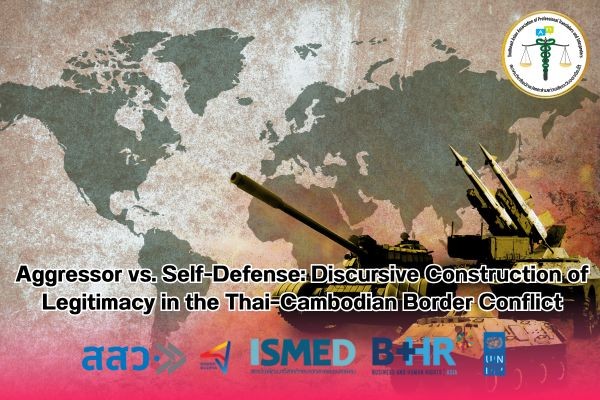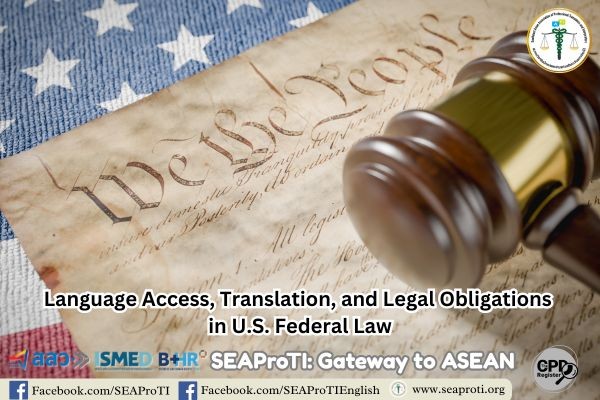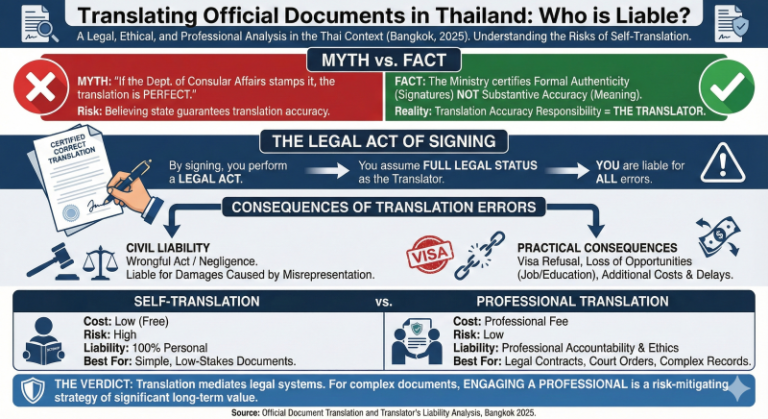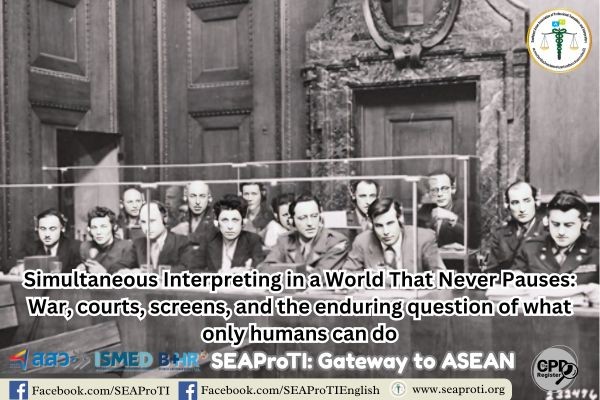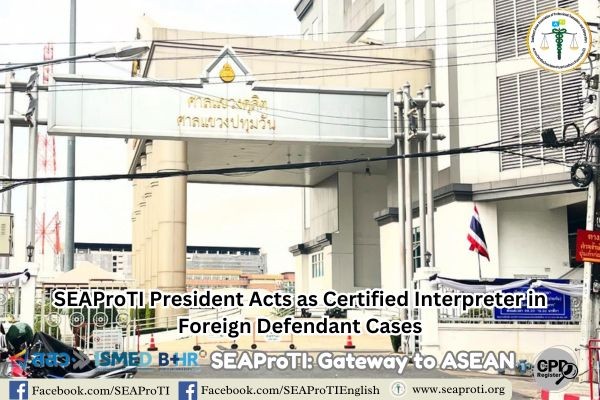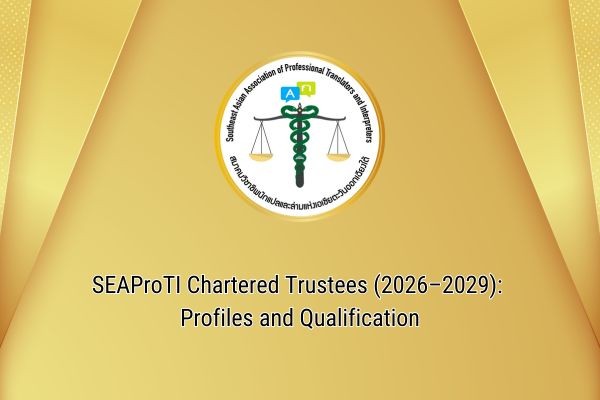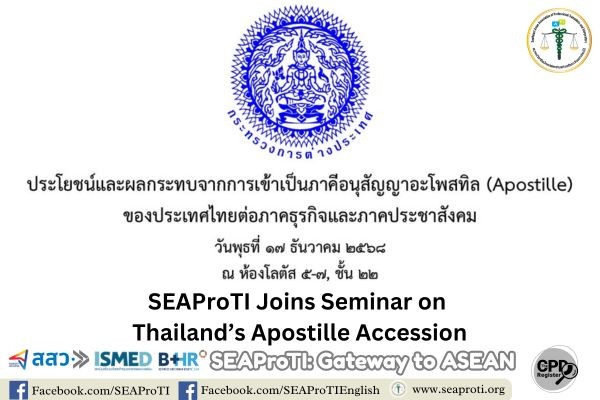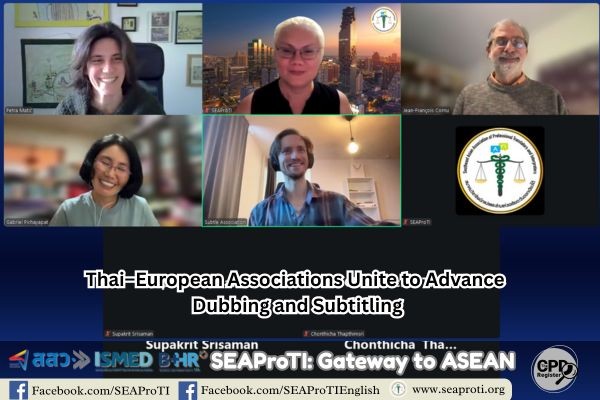Aggressor vs. Self-Defense: Discursive Construction of Legitimacy in the Thai–Cambodian Border Conflict
By Wanitcha Sumanat, President of the Southeast Asian Association of Professional Translators and Interpreters (SEAProTI)
This article analyzes the choice of terminology in the official diplomatic statements issued by the Cambodian and Thai governments regarding the border conflict that erupted on July 24, 2025. It focuses on Cambodia’s consistent use of the term “Aggressor” to describe Thailand, which discursively frames Thailand as the initiator of hostilities. In contrast, Thailand’s rhetoric emphasizes “self-defense” and “retaliatory response.” Employing the framework of Critical Discourse Analysis (CDA) and international law, this study investigates how language is used to construct legitimacy at the state level and to communicate with the international community.
The Discursive Battle between Thailand and Cambodia
In military confrontations or border disputes between states, the language used in official statements does not merely describe events but also functions as a “political tool” to shape the audience’s understanding. Especially on the international stage, legitimacy plays a key role in determining support or sanctions from global actors (Fairclough, 2015). In the Thai–Cambodian conflict, the Cambodian government consistently employed the term “Aggressor” to define Thailand’s role. Thailand, in turn, responded with terminology such as “self-defense” or “retaliatory response.” This illustrates a discursive battle wherein both parties attempt to position themselves as the “victim” acting under international law.
The Meaning and Implications of “Aggressor”
According to the Merriam-Webster Dictionary (2024), “Aggressor” is defined as:
- “A person, group, or nation that initiates hostilities or attacks first in a conflict.”
The term implies that the party described has initiated the use of force, which contradicts international legal norms prohibiting the unlawful use of force under Article 2(4) of the United Nations Charter (United Nations, 1945).
Furthermore, in international diplomacy, the United Nations has used the term “Aggressor” to identify the originator of war, serving as a basis for diplomatic penalties such as condemnation, sanctions, or the referral of cases to the International Court of Justice (ICJ).
Conflict Framing
Cambodia employed the term “Aggressor” in official statements issued by the Ministry of Foreign Affairs, the Senate, and national media, often in conjunction with strong expressions such as “violation of sovereignty,” “armed invasion,” and “intentional aggression.” This rhetorical strategy constructs a narrative in which Thailand is portrayed as a deliberate violator of Cambodian sovereignty. Such usage represents a legitimization discourse aimed at gaining international sympathy and support (Van Dijk, 1998).
Conversely, Thailand’s responses featured terms like “self-defense,” “retaliatory strike,” or “military response to clear threats,” citing Article 51 of the UN Charter, which upholds the right of states to defend themselves when attacked (UN Charter, 1945).
Political and Legal Implications
If the international community accepts one party’s designation of the other as the “Aggressor,” it may have several significant consequences:
- It weakens the accused party’s legal claim to self-defense under international law (Gray, 2018).
- It undermines the accused state’s human rights and humanitarian image, especially when civilian casualties are alleged.
- It opens the possibility of legal proceedings at the ICC or ICJ on grounds of war crimes or unlawful aggression.
Thus, the term “Aggressor” is not merely rhetorical; it is a strategic move in international diplomacy with potentially serious legal and political ramifications.
Conclusion
This analysis demonstrates that language in diplomatic discourse plays a vital role in the discursive struggle between states. Cambodia’s repeated use of the term “Aggressor” constructs a negative image of Thailand, while Thailand’s strategic framing emphasizes its legal right to self-defense. Understanding such discursive strategies is essential in interpreting the intersection of international law and power politics.
References
- Fairclough, N. (2015). Language and Power (3rd ed.). Routledge.
- Gray, C. (2018). International Law and the Use of Force (4th ed.). Oxford University Press.
- Merriam-Webster. (2024). Aggressor. Retrieved from https://www.merriam-webster.com/dictionary/aggressor
- United Nations. (1945). Charter of the United Nations. Retrieved from https://www.un.org/en/about-us/un-charter
- Van Dijk, T. A. (1998). Ideology: A Multidisciplinary Approach. Sage Publications.
SEAProTI’s certified translators, translation certification providers, and certified interpreters:
The Southeast Asian Association of Professional Translators and Interpreters (SEAProTI) has officially announced the criteria and qualifications for individuals to register as “Certified Translators,” “Translation Certification Providers,” and “Certified Interpreters” under the association’s regulations. These guidelines are detailed in Sections 9 and 10 of the Royal Thai Government Gazette, issued by the Secretariat of the Cabinet under the Office of the Prime Minister of the Kingdom of Thailand, dated July 25, 2024, Volume 141, Part 66 Ng, Page 100. The Royal Thai Government Gazette
Aggressor vs. Self-Defense: วาทกรรมการสร้างภาพของความชอบธรรมในความขัดแย้งชายแดนไทย–กัมพูชา
โดย วณิชชา สุมานัส นายกสมาคมวิชาชีพนักแปลและล่ามแห่งเอเชียตะวันออกเฉียงใต้ (SEAProTI)
25 กรกฎาคม 2568, กรุงเทพมหานคร – บทความนี้วิเคราะห์การเลือกใช้ถ้อยคำในถ้อยแถลงทางการทูตของรัฐบาลกัมพูชาและไทยในกรณีความขัดแย้งชายแดนที่เกิดขึ้นเมื่อวันที่ 24 กรกฎาคม 2568 โดยเน้นการใช้คำว่า “Aggressor” ที่กัมพูชาใช้ในการกล่าวถึงประเทศไทย ซึ่งมีนัยทางวาทกรรมเชิงสร้างภาพลักษณ์ว่าไทยเป็นฝ่ายเริ่มรุกรานก่อน ขัดกับกรอบถ้อยคำที่ไทยใช้คือ “การป้องกันตนเอง” (self-defense) การศึกษาใช้กรอบวิเคราะห์วาทกรรมเชิงวิพากษ์ (Critical Discourse Analysis: CDA) และกฎหมายระหว่างประเทศ เพื่อทำความเข้าใจว่าภาษามีบทบาทอย่างไรในการสร้างความชอบธรรมในระดับรัฐและสื่อสารกับประชาคมโลก
การสู้กันด้วยวาทกรรมระหว่างไทย–กัมพูชา
ในความขัดแย้งทางทหารหรือการเผชิญหน้าทางชายแดนระหว่างประเทศ ภาษาที่ใช้ในถ้อยแถลงของรัฐไม่ใช่เพียงการบรรยายเหตุการณ์เท่านั้น แต่ยังทำหน้าที่เป็น “เครื่องมือทางการเมือง” เพื่อกำหนดกรอบความเข้าใจให้กับผู้ฟัง โดยเฉพาะอย่างยิ่งในเวทีระหว่างประเทศที่ความชอบธรรมสามารถส่งผลต่อการได้รับการสนับสนุนหรือการคว่ำบาตรจากนานาชาติ (Fairclough, 2015) ในกรณีพิพาทไทย–กัมพูชา รัฐบาลกัมพูชาเลือกใช้คำว่า “Aggressor” อย่างต่อเนื่องเพื่อนิยามบทบาทของไทย ขณะที่ไทยตอบโต้โดยใช้คำว่า “self-defense” หรือ “retaliatory response” ซึ่งชี้ให้เห็นถึงการต่อสู้ทางวาทกรรมที่ทั้งสองฝ่ายพยายามสร้างภาพตนเองว่าเป็น “ผู้ถูกรุกราน” และมีความชอบธรรมตามกฎหมายระหว่างประเทศ
ความหมายและนัยของคำว่า “Aggressor”
คำว่า “Aggressor” ตามพจนานุกรมภาษาอังกฤษ มีความหมายว่า
- “A person, group, or nation that initiates hostilities or attacks first in a conflict” (Merriam-Webster, 2024)
การใช้คำนี้จึงมีนัยว่าฝ่ายที่ถูกกล่าวถึงได้กระทำการเชิงรุกและเป็นผู้เริ่มต้นใช้กำลัง ซึ่งตรงข้ามกับหลักการของกฎหมายระหว่างประเทศที่กำหนดให้ การใช้กำลังโดยไม่ชอบด้วยกฎหมาย (unlawful use of force) ถือเป็นการละเมิดกฎบัตรสหประชาชาติ มาตรา 2(4) (United Nations Charter, 1945)
นอกจากนี้ องค์การสหประชาชาติยังใช้คำว่า “Aggressor” เพื่อบ่งชี้ฝ่ายที่เป็นต้นเหตุของสงคราม และอาจเป็นเหตุผลในการลงโทษทางการทูต เช่น การประณาม การคว่ำบาตร หรือการยื่นเรื่องต่อศาลยุติธรรมระหว่างประเทศ (ICJ)
การวางกรอบความขัดแย้ง (Framing)
กัมพูชาใช้คำว่า “Aggressor” อย่างเป็นทางการในถ้อยแถลงของกระทรวงการต่างประเทศ วุฒิสภา และสื่อมวลชน โดยใช้ควบคู่กับคำที่มีนัยร้ายแรง เช่น “violation of sovereignty,” “armed invasion,” และ “intentional aggression” ทั้งหมดนี้มีผลในการสร้างภาพว่าไทยเป็นฝ่ายกระทำการละเมิดอธิปไตยและจงใจรุกรานก่อน ทั้งนี้เป็นการใช้วาทกรรมเชิงความชอบธรรม (Legitimization Discourse) เพื่อขอรับความเห็นชอบจากประชาคมโลก (Van Dijk, 1998)
ในทางกลับกัน ฝ่ายไทยเลือกใช้คำว่า “self-defense,” “retaliatory strike,” หรือ “military response to clear threats” โดยอ้างหลัก มาตรา 51 ของกฎบัตรสหประชาชาติ ที่รับรองสิทธิในการป้องกันตนเองเมื่อถูกรุกราน (UN Charter, 1945)
ผลทางการเมืองและกฎหมาย
การที่ฝ่ายหนึ่งถูกระบุว่าเป็น “Aggressor” โดยอีกฝ่าย หากได้รับการยอมรับจากนานาชาติ อาจมีผลกระทบหลายประการ ได้แก่:
- ลดทอนสิทธิในการอ้าง self-defense ตามกฎหมายระหว่างประเทศ (Gray, 2018)
- กระทบต่อภาพลักษณ์ด้านสิทธิมนุษยชนและมนุษยธรรม โดยเฉพาะเมื่อมีการกล่าวหาว่าโจมตีพลเรือน
- อาจเป็นเหตุให้นำข้อพิพาทเข้าสู่เวที ICC หรือ ICJ โดยกล่าวหาว่ามีความผิดฐานก่ออาชญากรรมสงคราม
ดังนั้น การใช้คำว่า “Aggressor” ไม่ใช่เพียงวาทกรรม แต่เป็นการวางหมากในกระดานการทูตที่อาจมีผลต่ออนาคตของข้อพิพาทอย่างมีนัยสำคัญ
บทสรุป
บทวิเคราะห์นี้ชี้ให้เห็นว่า ภาษาที่ใช้ในถ้อยแถลงทางการทูตมีบทบาทสำคัญในการต่อสู้ทางวาทกรรมระหว่างรัฐ โดยคำว่า “Aggressor” ที่กัมพูชาเลือกใช้นั้นมีนัยในการสร้างภาพลักษณ์ด้านลบแก่ประเทศไทยอย่างชัดเจน ขณะที่ไทยตอบโต้ด้วยกรอบถ้อยคำที่เน้นความชอบธรรมทางกฎหมาย ด้วยการใช้สิทธิในการป้องกันตนเอง การทำความเข้าใจกลยุทธ์วาทกรรมเหล่านี้จึงเป็นสิ่งสำคัญยิ่งทั้งในมิติของกฎหมายระหว่างประเทศและการเมืองเชิงอำนาจ
เอกสารอ้างอิง (References)
- Fairclough, N. (2015). Language and Power (3rd ed.). Routledge.
- Gray, C. (2018). International Law and the Use of Force (4th ed.). Oxford University Press.
- Merriam-Webster. (2024). Aggressor. Retrieved from https://www.merriam-webster.com/dictionary/aggressor
- United Nations. (1945). Charter of the United Nations. Retrieved from https://www.un.org/en/about-us/un-charter
- Van Dijk, T. A. (1998). Ideology: A Multidisciplinary Approach. Sage Publications.
เกี่ยวกับนักแปลรับรอง ผู้รับรองการแปล และล่ามรับรองของสมาคมวิชาชีพนักแปลและล่ามแห่งเอเชียตะวันออกเฉียงใต้
สมาคมวิชาชีพนักแปลและล่ามแห่งเอเชียตะวันออกเฉียงใต้ (SEAProTI) ได้ประกาศหลักเกณฑ์และคุณสมบัติผู้ที่ขึ้นทะเบียนเป็น “นักแปลรับรอง (Certified Translators) และผู้รับรองการแปล (Translation Certification Providers) และล่ามรับรอง (Certified Interpreters)” ของสมาคม หมวดที่ 9 และหมวดที่ 10 ในราชกิจจานุเบกษา ของสำนักเลขาธิการคณะรัฐมนตรี ในสำนักนายกรัฐมนตรี แห่งราชอาณาจักรไทย ลงวันที่ 25 ก.ค. 2567 เล่มที่ 141 ตอนที่ 66 ง หน้า 100 อ่านฉบับเต็มได้ที่: นักแปลรับรอง ผู้รับรองการแปล และล่ามรับรอง


